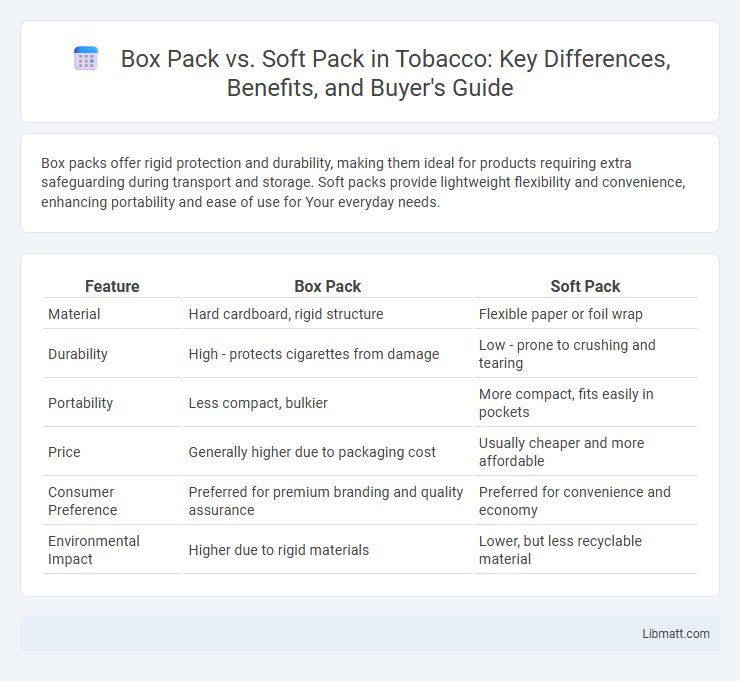Box packs offer rigid protection and durability, making them ideal for products requiring extra safeguarding during transport and storage. Soft packs provide lightweight flexibility and convenience, enhancing portability and ease of use for Your everyday needs.
Table of Comparison
| Feature | Box Pack | Soft Pack |
|---|---|---|
| Material | Hard cardboard, rigid structure | Flexible paper or foil wrap |
| Durability | High - protects cigarettes from damage | Low - prone to crushing and tearing |
| Portability | Less compact, bulkier | More compact, fits easily in pockets |
| Price | Generally higher due to packaging cost | Usually cheaper and more affordable |
| Consumer Preference | Preferred for premium branding and quality assurance | Preferred for convenience and economy |
| Environmental Impact | Higher due to rigid materials | Lower, but less recyclable material |
Introduction to Cigarette Packaging
Cigarette packaging primarily consists of box packs and soft packs, each offering distinct protection and user experience. Box packs feature a sturdy cardboard exterior that safeguards cigarettes from damage and maintains freshness, enhancing shelf appeal. Soft packs, made of flexible paper or foil, are lighter and more portable but provide less structural protection and are often preferred for their convenience.
What is a Box Pack?
A Box Pack is a type of cigarette packaging designed with a hard, sturdy exterior that protects the contents and maintains the cigarettes' shape and freshness. This rigid box often features a flip-top lid, providing easy access and secure closure to preserve your cigarettes longer. Box Packs are preferred for their durability and ability to showcase branding with high-quality printing and embossing options.
What is a Soft Pack?
A Soft Pack is a type of cigarette packaging made from pliable paper or thin cardboard, designed for portability and ease of use. Unlike Box Packs, which offer rigid protection, Soft Packs are lightweight and compressible, making them convenient for on-the-go smokers. Your choice between Soft Pack and Box Pack depends on whether you prioritize durability or flexibility in cigarette packaging.
Durability and Protection Comparison
Box packs offer superior durability and protection due to their rigid structure, effectively preventing crushing and physical damage during transportation and handling. Soft packs, made from flexible materials like foil and plastic, provide less structural support and are more prone to punctures and deformation under pressure. The enhanced sturdiness of box packs makes them ideal for products requiring robust protection, while soft packs prioritize lightweight convenience over extreme durability.
Portability and Convenience
Soft packs offer greater portability due to their lightweight and flexible design, making them easier to carry in pockets or small bags. Box packs provide enhanced convenience by protecting contents from damage and maintaining shape, ideal for on-the-go use without crushing. Your choice depends on whether you prioritize compactness for quick access or sturdiness for product protection during travel.
Freshness and Shelf Life
Box packs provide superior protection against external factors such as moisture and light, significantly extending the freshness and shelf life of products compared to soft packs. Soft packs, while more flexible and lightweight, offer less barrier protection, making them more susceptible to exposure that can degrade product quality over time. Choosing box packaging enhances product preservation, ensuring longer-lasting freshness and optimal shelf life.
Environmental Impact
Soft packs generate less waste than box packs due to their minimal use of cardboard and lighter plastic materials, resulting in reduced carbon emissions during transportation. Box packs, while providing better protection and shelf life, often involve more packaging components that contribute to increased landfill waste and challenges in recycling. Choosing soft packs can significantly decrease environmental footprints by lowering resource consumption and enhancing pack recyclability.
Consumer Preferences and Trends
Consumer preferences for box packs versus soft packs reveal a growing trend toward convenience and sustainability, with many favoring soft packs for their lightweight and recyclable materials. Box packs maintain popularity due to their superior protection and premium appeal, especially in luxury and gift markets. Market data indicates rising demand for soft packs among younger demographics seeking portability and eco-friendly options.
Cost Differences
Box packs typically incur higher production costs due to the use of rigid cardboard materials and more complex assembly processes, impacting their retail price. Soft packs, made from flexible foil or plastic films, offer lower manufacturing and transportation expenses due to reduced weight and volume. Brands favor soft packs to achieve cost efficiency and appeal to budget-conscious consumers without compromising product freshness.
Which Pack is Right for You?
Choosing between a box pack and a soft pack depends on your lifestyle and convenience needs. Box packs offer sturdy protection and easy stacking, ideal for home or office storage, while soft packs provide lightweight, flexible packaging suited for on-the-go use. Assess your storage preferences and portability requirements to determine which pack aligns best with your daily habits and space constraints.
Box pack vs Soft pack Infographic

 libmatt.com
libmatt.com